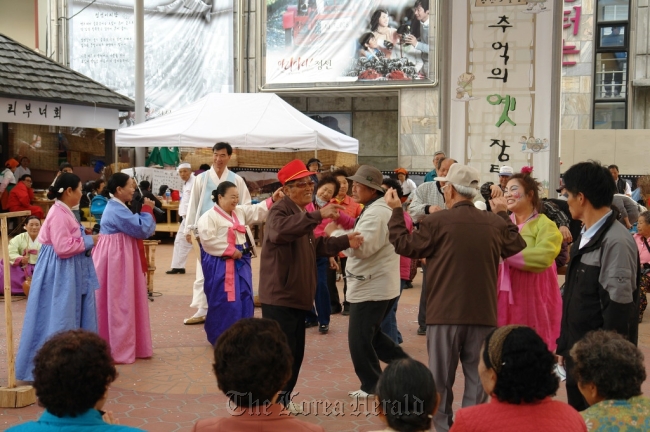Arirang listed as UNESCO Intangible Cultural Heritage
Chinese reportedly skip attempt to register regional version of folk song as their own cultural heritage
By Korea HeraldPublished : Dec. 6, 2012 - 19:58
Iconic Korean folk song Arirang was added to the UNESCO Intangible Cultural Heritage of Humanity list on Thursday.
The listing will allow Korea to pave the way for promotion and conservation as well as protection of the song that has been sung across the nation in different versions for over 2,000 years.
The Intergovernmental Committee for the Safeguarding of the Intangible Cultural Heritage made the decision at the UNESCO general assembly held on Dec. 3-7 in Paris, upholding a subsidiary body’s recommendation made earlier last month.
The UNESCO members agreed that “Arirang is constantly recreated in various social contexts, places and occasions, serving as a marker of identity among its bearers while promoting values of solidarity and social cohesion; and an inscription of Arirang on the Representative List could promote greater visibility of intangible cultural diversity and creativity, particularly because of the great variety found within a single element.”
The listing will allow Korea to pave the way for promotion and conservation as well as protection of the song that has been sung across the nation in different versions for over 2,000 years.
The Intergovernmental Committee for the Safeguarding of the Intangible Cultural Heritage made the decision at the UNESCO general assembly held on Dec. 3-7 in Paris, upholding a subsidiary body’s recommendation made earlier last month.
The UNESCO members agreed that “Arirang is constantly recreated in various social contexts, places and occasions, serving as a marker of identity among its bearers while promoting values of solidarity and social cohesion; and an inscription of Arirang on the Representative List could promote greater visibility of intangible cultural diversity and creativity, particularly because of the great variety found within a single element.”

The lower body’s recommendation was based on three main points. The first was that representatives of the tradition’s bearers were involved in planning safeguards for Arirang after its inclusion on the list. Also, that there was a clear commitment from Korea to provide legal framework for safeguarding the various cultural expressions of the country. Lastly, academics, researchers and local and regional authorities were consulted throughout the nomination process and their evidence was given with their consent.
The members also acknowledged that after a multi-year process of consultation with the communities concerned, Arirang was included in 2012 in the State Inventory of Intangible Cultural Heritage maintained by the Korean Cultural Heritage Administration.
Arirang, which is believed to have been derived from a folk song in the Gangwon area more than 2,000 years ago, has developed into more than 50 different versions reflecting Koreans’ unique sentiment of “han,” representing the suppressed, but hopeful desire for justice. It is also believed to have played a key role in consolidating Korean people throughout the historical hardships and building up the Korean identity.
Arirang survived the forcible cultural assimilation policies of Japanese colonial rule (1910-1945). A movie titled “Arirang” was produced in 1926, credited with leading the spirit of resistance against the Japanese colonial rule among Koreans. After the liberation, the song became the title of an international tour by the “Little Angels,” a group of young performers who performed traditional dances and songs, including “Arirang,” around the world.
“I cannot even count the number of different versions of Arirang. But one thing for sure is that it contains what all Koreans feel ― sometimes sorrow, sometimes joy and sometimes anger,” said professor Kwon Oh-kyung of Busan University of Foreign Studies.
“There are love stories, there is famine, poverty, hunger, tears and every feeling in the song.”
Kim Yeoun-gab, the author of “The Culture of Arirang” and executive director of the Korean Arirang Association, a private group, explained that all versions had “Arariyo” as a refrain and used the word “Arirang” repeatedly.
The government had initially planned to have the song listed jointly with North Korea but failed and pushed for sole inscription in June.
The Chinese government has reportedly been interested in getting “Jangbaek (the Chinese name for Mt. Baekdu area) Arirang” on the UNESCO intangible cultural heritage list to preserve it among ethnic Koreans in the northeastern part of the country. However, it did not apply for the listing this time, the Ministry of Culture, Sports and Tourism said.
With Arirang’s inscription, Korea has 15 items on UNESCO’s Intangible Cultural Heritage of Humanity List, including the Royal Ancestral Rites and Ritual Music at the Jongmyo Shrine, which was performed at memorial ceremonies during the Joseon era; “pansori,” a traditional Korean style of narrative song; and falcon hunting.
By Bae Ji-sook (baejisook@heraldcorp.com)
-
Articles by Korea Herald










![[Hello India] Hyundai Motor vows to boost 'clean mobility' in India](http://res.heraldm.com/phpwas/restmb_idxmake.php?idx=644&simg=/content/image/2024/04/25/20240425050672_0.jpg&u=)









